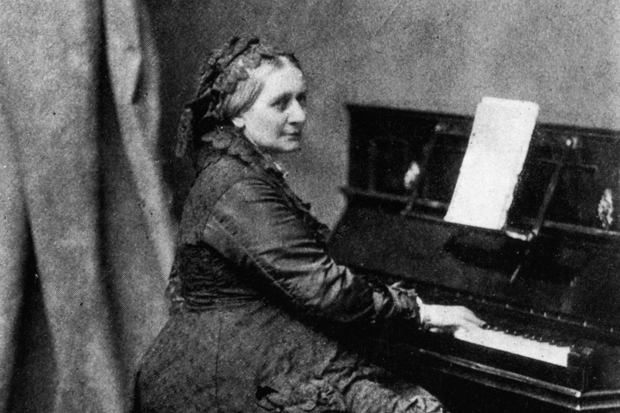Just a few weeks ago, Germany’s VAN magazine published an interview with the composer Olga Neuwirth. In it she describes her early career in the 1980s and ’90s — a ‘lone’ female voice in the ‘wilderness’ of classical music. So far, so sadly, so frustratingly predictable. But then she turns to the current situation and things become rather more startling. ‘I think it has become nastier,’ she says:
A more ‘elegant’ chauvinism prevails… When a woman calls attention to injustices today her objections are often dismissed as hysteria… She is kicked out and declared an adversary without further explanation or discussion.
We’re used to the idea that — in the arts at least — the feminist fight is all but over. Women take their place alongside men as authors, artists, choreographers and filmmakers, and it seems out of step with this shiny new equality to suggest that all might not be quite so entirely right on. But Neuwirth’s experiences as a ‘woman composer’ are by no means isolated.
Anna Beer’s Sounds and Sweet Airs offers vivid, colourful context on a situation that is echoed back through the centuries. Beer profiles eight ‘forgotten’ female composers, each a prism for the ideology, philosophy and fashions of her age. But whether we are in corsets or Converse, Medici Florence or 20th-century Paris, Louis XIV’s Versailles or 21st-century London, the stories are the same. Even in ninth century Constantinople we encounter Kassia — the earliest female composer whose music survives today — so disgraced by her wise and witty responses to Emperor Theophilus (auditioning for a bride) that she retires to a convent to compose a penitential hymn to Mary Magdalene.
Again and again, female genius confounds those who encounter it. Talented female composers must either be ‘angels’ or ‘sorceresses’ to possess such gifts, and that’s just the lucky ones. The others must constantly dodge the ‘shadow of the courtesan’ that threatens to engulf anyone bold enough to present herself and her skills to the public. Beer even goes so far as to suggest that Clara Schumann’s ‘relentless pregnancies’ were, at least in part, an attempt to reassure her audience of her unthreatening propriety — an ‘Angel in the House’ rather than a lady of the night.
It’s as heartbreaking as it is maddening to read of Schumann, beaten down by parental and societal pressure, writing resignedly,
I once thought that I possessed creative talent, but I have given up this idea; a woman must not desire to compose — not one has been able to do it, and why should I expect to?
It’s even more frustrating to learn that, nearly 100 years later, when Elizabeth Maconchy was denied a prestigious Royal College of Music scholarship, the excuse given was, ‘If we’d given it to you, you’d only have got married and never written another note!’ But, in common with all the women profiled here, neither Schumann nor Maconchy did give up. Beer explains her selection process in the introduction, favouring those who ‘evaded, confronted and ignored’ the conventions that sought to exclude them from composing.
But the lives Beer invites us into so engagingly don’t entirely bear this out. Neither Schumann nor Fanny Mendelssohn (later Hensel), nor Louis XIV’s favoured Élisabeth Jacquet de La Guerre nor even Lili Boulanger — the first female composer to win the Prix de Rome — succeeded through open rebellion or active subversion. It was rather their outward conformity, their willingness to play up to stereotypes of feminine passivity and delicacy, to ideals of domesticity and motherhood, that allowed them to flourish professionally — that, and some surprisingly supportive husbands, brothers and fathers. Their lives were models of middle-class propriety, virtuous enough to carry off a quirk like composition. Earlier pioneers Francesca Caccini and Barbara Strozzi played a more dangerous game, with Strozzi in particular embracing a necessary notoriety, but even they did little to disturb the patriarchal universe.
Readable and wide-ranging, Beer’s deft sketches are an elegant introduction to their subjects. But there is a flaw at the heart of Sounds and Sweet Airs that is hard to accept. Beer’s explicit aim is to hold up a megaphone to the voices of female composers that have remained unheard, ignored or suppressed. Yet women who have consistently been forced to express themselves through their lives rather than their art here find that process replicated. We hear lots about these composers’ loves, illnesses, their families and domestic responsibilities, but very little about their music.
So, in many ways, this book is just an introduction — a formal handshake after a few whispered biographical asides. If you really want to get to know Barbara Strozzi, Fanny Hensel or Lili Boulanger you’d do better to skip the intermediary. Just listen to their music; it’s here and here only that you’ll find the true selves of classical music’s ‘forgotten’ women, in works that need no biographical defence, no historical apology, to stand alongside those of their male counterparts.






Comments